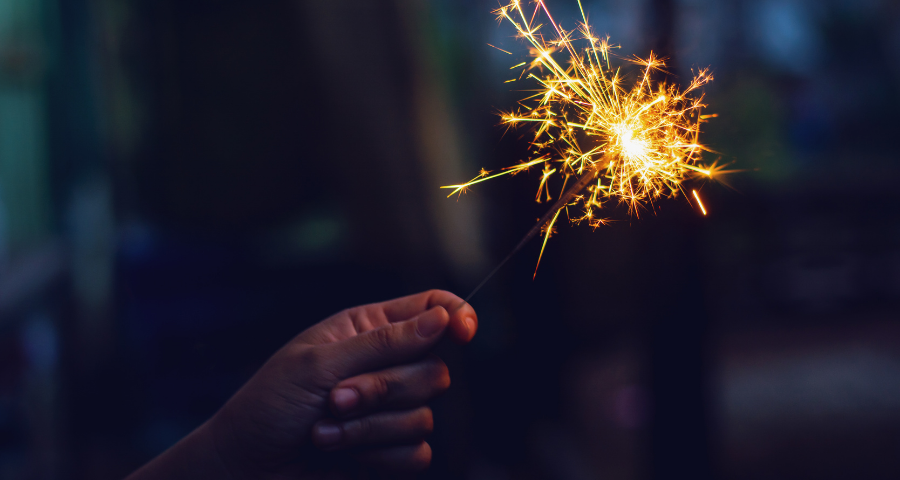Want A New Year’s Resolution That Will Actually Make a Real Difference?
Happy New Year, friends! Or is it actually more like, “Can we just have a Happy New Year already?!” The last few years have left most of us feeling as if we can barely keep our heads above water. We’ve hardly processed 2020, let alone 2021, and now we’re in a brand-spanking-new 2022 and we’re still dealing with, well, EVERYTHING. We’re on our umpteenth COVID variant, we’re still arguing about politics . . . and it’s time for our annual resolutions, diet and exercise promises, and career and family goals!
(Let’s take a moment to collectively take a big, BIG breath.)
All joking aside, there’s something helpful about New Year’s and the chance to evaluate what has worked well in the past, what hasn’t, and what I’d like to do in the future. And one of those things is always, “How can I love others better this year?” I know I’m not alone in that desire—especially given that Jesus Himself called us to love others how He loves us. And wow, does He love extravagantly . . . including, might I add, even those who are a tad difficult?
I have a feeling 2022 could use a lot more of that.
So what’s a New Year’s resolution that might make a real difference in making 2022 a better year than the last? Well, it has to do with our reactions when things don’t exactly go our way.
Hair Trigger Responses
When we did the research for The Kindness Challenge, one of our findings is that many of us have an unrecognized tendency to catastrophize. “If such and such happens, it will be a catastrophe!” For example, “If this person gets elected, it will be a catastrophe!” Or “If my friend dates so-and-so . . .” Or “If we don’t do something about such-and-such . . .” Or “If my child doesn’t study for this test . . .” It is so easy to finish those sentences with: it will be a catastrophe. And don’t get me wrong, that may very well be true!
But what we found in the research is that for some reason, we often become remarkably unkind in confronting that potential catastrophe. We give ourselves license to not be our best selves—to be an unkind, ungracious person because we feel justified in our fear/angst/worry/alarm. But when we look back in our right mind (days, or weeks, or months, or years later) we often find ourselves saying, “what was I thinking?”
Many people today have seen how unkind and divided our culture has become, right? Well one of the main reasons is how much we have let ourselves have a “hair trigger.” We have such a knee-jerk reaction to these potential catastrophes and the harm that could result—and we focus on the catastrophe so much—that we lose any sense of objectivity about a) how likely the harm is and b) the fact that we can cause harm when we confront it.
That’s why I love one man’s honesty and cautionary tale for all of us.
A Note From A Friend
Quite a few years ago, a group of Jeff’s close friends from high school used to have a very active Facebook group. They mostly talked about sports and kids, but occasionally they would discuss whatever the major issue of the day happened to be.
One season, a particular issue rose up that stirred some debate among them. Several of them chose one side, most weren’t that invested, and a few took the other. And this is what Jeff’s friend admitted:
I was in the first camp and let me tell you, did I take myself seriously. Believing myself to be in the right, I loaded up on arguments, counterarguments, historical data, and I went to town. Being a reasonably smart guy and decent writer (forgive the immodesty), I went hard. Really hard. Whenever anyone tried to argue with me, I answered with sarcasm and smarminess. I may have been “right” in my arguments, but there’s no excuse for my behavior. I was a jerk.
Ignoring The Signals
He continued:
One particular friend who disagreed with me tried to send me signals, but I blew right past those. Thinking his efforts to disengage were weakness, I went even harder, desperate to claim my victory. By the time I realized my grave mistake, it was too late. I had deeply wounded my friend. I confessed my sin and he was gracious to forgive me. I repented and in His mercy, God has held me in that. But I had said things that couldn’t be unheard. I had written things that couldn’t be unread. That friendship has never been what it once was. I’m hopeful it may be again someday, but I will need to walk a very humble road for that to happen. All these years later, I don’t feel so strongly about the issue we were debating. But I miss my friend.
And so, dear friends, I hope you’ll learn from my mistake. I know you think that post needs a response. I know you think you’re right. You probably are. But I’m telling you there’s a cost. Make sure it’s one you’re prepared to pay and trust me when I say it probably isn’t. Soon enough—whether months or years from now—you won’t care that much about whatever issue just popped up. But you’ll really wish that friendship was in a better place.
Be Willing To Take A Step Back
I have a close friend with whom I disagree on quite a lot of political and theological issues. My friend is part of multiple Facebook groups with like-minded people who were up in arms and upset about a particular issue in the Christian community. They spent months deconstructing it, talking about how damaging it was, talking about what to do about it, actually doing things about it, and trolling people on social media who were disagreeing with them. The list went on.
But just a week or two ago, people in their group have started asking themselves, “Is this as damaging as we’ve been making it out to be now that we’ve had a few months to look at this?” And many of them decided it wasn’t as big of a deal as they initially thought. Yet they had spent months sharing angry posts and getting mad at people and, in my opinion, causing harm to others—all out of their understandable concern about the original harm.
Friends, we have to be willing to take a step back and be as objective as we can about our passion for a topic or concern. Are we building it up in our minds and making it a catastrophe because we are talking to other like-minded people and creating a “mob mentality” with those who see things the same way? And if so, are we giving ourselves license to sacrifice others’ thoughts and feelings as collateral damage for our cause?
Or perhaps, in this new year, could we consider a better way? One that allows our relationships to thrive due to our determined respect and kindness, even if our concern is totally warranted? I believe this is a cause worth fighting for—and spreading. Because of all the unhealthy things in our world being passed around these days, let’s use love, respect, and kindness to make this new year a much better one.
(If you recognize the need for a different habit and mindset, take the 30-Day Kindness Challenge, which challenges us to do the same three things every day for one month and which has an 89% success rate. Sign up for our free daily reminders and tips and make 2022 a great year for your life and relationships!)
If you are interested in having Shaunti bring research-based strategies, practical wisdom and biblical principles to your next event, please contact Nicole Owens at [email protected].
On our podcast, I Wish You Could Hear This, Jeff and I offer proven steps to help you thrive in your life, faith and relationships. In other words, we’ll offer the practical help you’ve grown accustomed to right here in this blog space. You’ll take away specific steps that help you today. Listen, follow, and share with your friends on YouTube, Apple Podcasts, Spotify and other platforms.
Please note: This post may contain affiliate links. As an Amazon Associate we earn a small amount from qualifying purchases through these affiliate links. This doesn’t cost you anything, and helps us continue bringing you great content!







